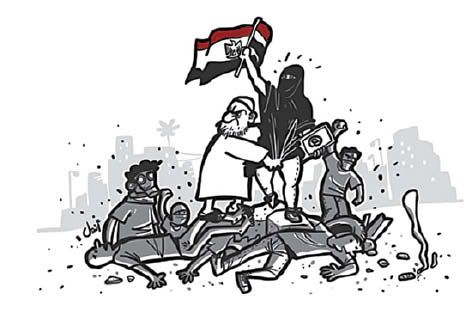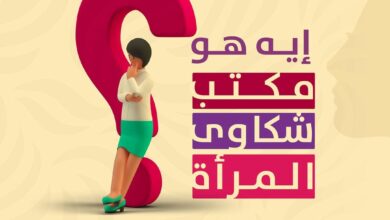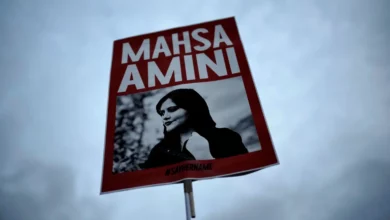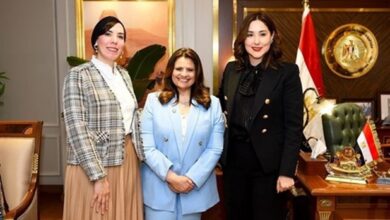
A face-off between the Muslim Brotherhood and the National Council for Women (NCW) over a newly ratified United Nations declaration has raised more flags around the Brotherhood’s attitude toward women’s rights. Unexpectedly, it also piqued curiosity about the nature of the relationship between the group and the council.
The NCW’s signature on the declaration, which seeks to combat violence against women, created a backlash from the Brotherhood and other nongovernmental organizations with links to the Brotherhood. But other women’s rights groups are skeptical, arguing the feud is more simulated than real.
The contested declaration
The Brotherhood described the declaration as the “final step in the intellectual and cultural invasion of Muslim countries, eliminating the moral specificity that helps preserve the cohesion of Islamic societies.”
In a detailed statement objecting to articles of the declaration, the Brotherhood said its title — “End Violence against Women” — was misleading and deceptive, adding that its articles “contradict established principles of Islam, undermine Islamic ethics and destroy the family.”
The statement further warned that the declaration would lead to the complete disintegration of society.
The NCW dismissed the Brotherhood’s statement, listing several reasons why it was “completely false.” Its statement said claims of the declaration being in violation of Sharia were “a misuse of religion,” and an attempt to tarnish the UN’s image in order to quash women’s rights.
The council said such statements were not in Egypt’s or the ruling regime’s best interests, advising it not to take an opposing position to that of other countries and the UN.
It also pointed out that the declaration contrarily advocates law enforcement and executing national plans to combat violence against women, while stressing equality in education, health, social security and human rights, and cooperation with civil society.
NCW spokesperson Mohamed Abdel Salam remained tight-lipped on the matter, saying the council’s views on the Muslim Brotherhood and the UN declaration were clearly expressed in the statement published on the council’s website.
He dismissed any deeper conflict between the Brotherhood and the council, saying, “We are a national council for all Egyptians.”
“We don’t only serve liberals or Islamists or any other political currents, we work within a legal framework,” he added.
However, other women’s rights groups see the Brotherhood and the NCW as one and the same. They claim the showdown between the group and the council was staged, as the ruling party tries to maintain a balance between its international and local reputation.
Lamya Lotfy, who works on the Committee on the Elimination of Discrimination against Women in the New Woman Foundation, says there are two parallel discourses.
On the one hand, she says, there is an “international address,” where the state and its ruling party, represented in the NCW, seek to appear liberal. On the other hand, there is a “local address,” where the Brotherhood objects to appease its Islamist support base in Egypt.
“Egypt signed the declaration, so the state and its ruling party signed it,” Lotfy says. “If you are so against the declaration, why don’t you revoke your signature?”
The ruling party has to maintain its image both on the international and local scenes by giving two different reactions to the declaration, she argues.
Dalia Abdel Hameed, gender and women’s rights program officer at the Egyptian Initiative for Personal Rights, echoes this sentiment and concludes that the rift between the NCW and the Brotherhood is “superficial.”
Abdel Hameed, who attended the UN’s Commission on the Status of Women in New York as part of the Egyptian delegation, along with presidential adviser Pakinam al-Sharqawy, says that the Muslim Brotherhood’s agenda toward women’s rights is “not surprising.” But, she adds, they are now the ruling elite and represent Egypt in the international community.
The Brotherhood adopts an approach that rejects equality as a concept and is dismissive of women’s rights, she says, all the while leaning on a religious and culture discourse.
“This is an old, destructive weapon because Egypt is a diverse culture, and we currently live in a global community,” Abdel Hameed says.
She adds that the Brotherhood’s statement on the UN declaration was not only “false,” but ignored important articles that pertain to human rights.
“Why would you ignore articles that defend human rights unless you yourself violate them?” she asks, citing Mervat Moussa, an activist who was slapped and fell to the ground in front of the Brotherhood headquarters in Moqattam Saturday, during clashes.
A contested council
Other organizations with links to the Brotherhood have been vocal in criticizing the NCW as well as the declaration. The Egyptian Center for Monitoring Women’s Priorities, for instance, described it as a “comprehensive project to destroy all that is related to our traditions and values and the Muslim identity.”
The International Union of Muslim Scholars, an Islamic union headed by veteran Brotherhood member Yusuf al-Qaradawi, agreed, calling on the UN to “respect religious diversity and Islamic values in international agreements regarding women, children and other documents,” while asserting its rejection of violence against women.
Lotfy, however, describes these organizations as “government organizations that operate as NGOs.”
Late last week, an NGO with links to the Brotherhood named Misr Awalan (Egypt Fisrt) organized a protest in front of the Foreign Ministry against the UN declaration, warning it would “destroy the Egyptian family” and that it violated Sharia.
The protest was followed by a statement issued by the organization in the name of “Egyptian women,” denouncing the declaration as well as the NCW.
The statement accused the NCW and other civil society groups of adopting “principles of segregation and discrimination between men and women under the pretense of advocating freedom,” and of promoting ignorance and the corruption of society.
“We call for a strong stable family institution governed by Sharia and our traditions, not foreign treaties,” the statement read. It went on to list the same 10 points listed by the Brotherhood statement in objection to the declaration.
Earlier this year, Misr Awalan also demanded that the NCW be dissolved, saying it sought to destroy Egyptian families and violated Sharia.
Waleed Samy, head of the organization’s family affairs committee, reiterates the call to disband the NCW and restructure it, as well as amend the family affairs law.
He explains that Misr Awalan calls for the formation of a “family council,” rather than one specifically for women, which he sees as discriminatory. “The family consists of a father, mother and children. Why is the council only focused on women?” he asks.
The organization also accuses the NCW of supporting Western ideologies and including members from the ousted regime. Samy claims two-thirds of the council is comprised of members of the now-disbanded National Democratic Party (NDP), who will continue to “destroy society.”
Earlier last year, Field Marshal Hussein Tantawi, Egypt’s de facto leader at the time, issued a law selecting 30 new members of the council, including women’s rights activists, academics and public figures, after a lawsuit was filed with the Cairo Administrative Court demanding its dissolution. The plaintiffs said NDP members formed the party and used it to achieve dubious objectives.
Former Social Affairs Minister Mervat al-Talawy replaced the council’s head, Farkhonda Hassan, who was known for her strong ties to former first lady Suzanne Mubarak.
Samy thus explains that the council was unconstitutional to begin with, since it was formed by the previous leader of Egypt, and that the current president has the right to restructure it.
Abdel Hameed, however, says the “remnants of the ousted regime mantra” is a weapon used by the Brotherhood whenever it is in its favor to do so. She says the current regime has long ignored initiatives proposed by NGOs to improve the NCW, suggesting that keeping it as is plays into their agenda.
“It is in their best interest to keep the NCW and use it in the international community, since the truth is the council was never progressive to begin with,” she explains. She adds that the situation has worsened with the Brotherhood rule.
Both Abdel Hameed and Lotfy admit they have reservations about the council’s current structure. “We respect Mervat al-Talawy but there is a problem with the council’s structure that I’m sure she recognizes herself,” Lotfy says, explaining that members are appointed by the president rather than elected.
Lotfy further explains that although the NCW is a government entity, it operates as a civil society organization. “It should work on pushing for laws that are proposed by women’s groups and changing state policies,” she says.
Abdel Hameed adds that although they are not pleased with the current council, calls to dissolve it are nonetheless alarming.
“The Muslim Brotherhood is more concerned with the family as an institution, so if it were to dissolve the council, women’s rights would be completely wiped from the picture,” says Abdel Hameed.
Lotfy says that while she has reservations regarding the council, disbanding it is not the solution, but rather, restructuring it and having it operate in a transparent environment.
Waleed says the organization has a vision for a new council, to include “moderate and reputable figures,” who aim to “bring the Egyptian family together.” He dismissed concerns of the “Brotherhoodization” of the council, saying the NGO seeks members who do not belong to any political current or party.
This piece was originally published in Egypt Independent's weekly print edition.




